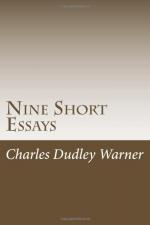We gratefully acknowledge also the remark of the Blackwood writer in regard-to the claims of America in literature. “These claims,” he says, “we have hitherto been very charitable to.” How our life depends upon a continual exhibition by the critics of this divine attribute of charity it would perhaps be unwise in us to confess. We can at least take courage that it exists—who does not need it in this world of misunderstandings?—since we know that charity is not puffed up, vaunteth not itself, hopeth all things, endureth all things, is not easily provoked; whether there be tongues, they shall cease; whether there be knowledge, it shall vanish; but charity never faileth. And when all our “dialects” on both sides of the water shall vanish, and we shall speak no more Yorkshire or Cape Cod, or London cockney or “Pike” or “Cracker” vowel flatness, nor write them any more, but all use the noble simplicity of the ideal English, and not indulge in such odd-sounding phrases as this of our critic that “the combatants on both sides were by way of detesting each other,” though we speak with the tongues of men and of angels—we shall still need charity.
It will occur to the charitable that the Americans are at a disadvantage in this little international “tiff.” For while the offenders have inconsiderately written over their own names, the others preserve a privileged anonymity. Any attempt to reply to these voices out of the dark reminds one of the famous duel between the Englishman and the Frenchman which took place in a pitch-dark chamber, with the frightful result that when the tender-hearted Englishman discharged his revolver up the chimney he brought down his man. One never can tell in a case of this kind but a charitable shot might bring down a valued friend or even a peer of the realm.
In all soberness, however, and setting aside the open question, which country has most diverged from the English as it was at the time of the separation of the colonies from the motherland, we may be permitted a word or two in the hope of a better understanding. The offense in The Century paper on “England” seems to have been in phrases such as these: “When we began to produce something that was the product of our own soil and of our own social conditions, it was still judged by the old standards;” and, we are no longer irritated by “the snobbishness of English critics of a certain school,” “for we see that its criticism is only the result of ignorance simply of inability to understand.”
Upon this the reviewer affects to lose his respiration, and with “a gasp of incredulity” wants to know what the writer means, “and what standards he proposes to himself when he has given up the English ones?” The reviewer makes a more serious case than the writer intended, or than a fair construction of the context of his phrases warrants. It is the criticism of “a certain school” only that was said to be the result of ignorance. It is not the English language nor its body of enduring




